Harakiri Blu-ray Movie
HomeHarakiri Blu-ray Movie 
切腹 / SeppukuCriterion | 1962 | 133 min | Not rated | Oct 04, 2011
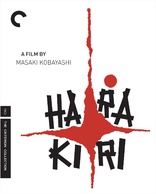
Movie rating
8.9 | / 10 |
Blu-ray rating
| Users | 4.8 | |
| Reviewer | 4.5 | |
| Overall | 4.5 |
Overview
Harakiri (1962)
Following the collapse of his clan, an unemployed samurai arrives at the manor of Lord Iyi, begging to be allowed to commit ritual suicide on the property. Iyi's clansmen, believing the desperate ronin is merely angling for a new position, try to force his hand and get him to eviscerate himselfŚbut they have underestimated his beliefs and his personal brand of honor.
Starring: Tatsuya Nakadai, Akira Ishihama, Shima Iwashita, Tetsur˘ Tanba, Masao MishimaDirector: Masaki Kobayashi
| Foreign | Uncertain |
| Drama | Uncertain |
| Period | Uncertain |
Specifications
Video
Video codec: MPEG-4 AVC
Video resolution: 1080p
Aspect ratio: 2.34:1
Original aspect ratio: 2.35:1
Audio
Japanese: LPCM Mono (48kHz, 24-bit)
Subtitles
English
Discs
50GB Blu-ray Disc
Single disc (1 BD)
Playback
Region A (locked)
Review
Rating summary
| Movie | 5.0 | |
| Video | 4.5 | |
| Audio | 4.5 | |
| Extras | 4.0 | |
| Overall | 4.5 |
Harakiri Blu-ray Movie Review
Reviewed by Dr. Svet Atanasov September 3, 2011Masaki Kobayashi's "Seppuku" a.k.a. "Harakiri" (1962) arrives on Blu-ray courtesy of Criterion. The supplemental features on the disc include the film's original theatrical trailer; video introduction by Japanese-film historian Donald Richie; video interview with Masaki Kobayashi conducted by fellow director Masahiro Shinoda; video interview with Japanese icon Tatsuya Nakadai; and a video interview with screenwriter Shinobu Hashimoto. The disc also arrives with an illustrated booklet featuring an essay by film scholar Joan Mellen and a reprint of an interview with Masaki Kobayashi. In Japanese, with optional English subtitles for the main feature. Region-A "locked".
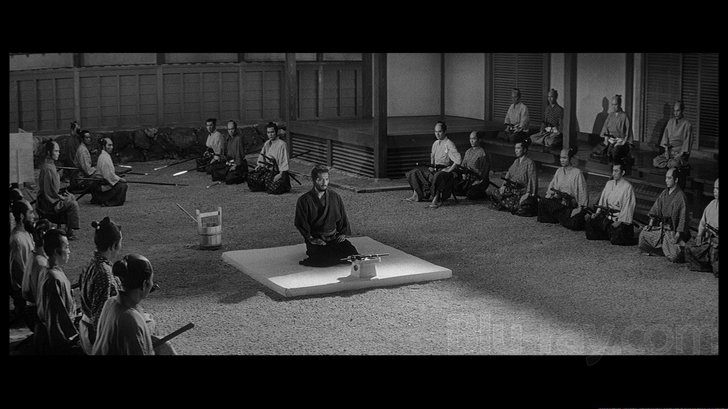
The ronin
Japan, 1630. Disillusioned ronin Hanshiro Tsugumo (Tatsuya Nakadai, Yojimbo, Kagemusha) enters the manor of Lord Lyi and asks for permission to commit harakiri (self-inflicted disembowelment). The clan's leader, Kageyu Saito (Rentar˘ Mikuni, The Burmese Harp, Vengeance Is Mine), is reluctant to grant his wish because he suspects that Hanshiro is simply looking for charity -- like Motome Chijiiwa (Akira Ishihama, Namida, Day-Dream), another masterless ronin, who not long before Hanshiro attempted to cheat the wealthy clan.
But Hanshiro insists that he has made up his mind and is indeed ready to die -- with a proper ceremony. Intrigued and sensing that Hanshiro is sincere, the clan's leader decides to hear his story to determine whether to grant his wish or ask him to leave.
Hanshiro begins his story...
Harakiri is brutal, dark and deeply unsettling, lacking the glamor of Akira Kurosawaĺs samurai films. Almost immediately after Hanshiro enters the manor of Lord Lyi it becomes obvious that he is a different kind of ronin, fearless but disillusioned and angry at the system he belongs to, desperate and sad. Kurosawaĺs ronin are proud and optimistic men, comfortable in their own skin, fitting well into the samurai system. Hanshiro is the exact opposite of what they are -- he is an outcast, a man who despises the culture and philosophy he represents.
The legendary Tatsuya Nakadai essentially plays three different characters in Harakiri. The first time Hanshiro appears on the screen he is a fearless warrior. He immediately creates the impression of a man who always speaks the truth. Later on, a series of flashbacks reveal his human side. During the final third of the film, Hanshiro becomes an animal and anger takes over his body.
Directed by acclaimed Japanese filmmaker Masaki Kobayashi, who also directed the monumental nine-and-a-half-hour drama The Human Condition, Harakiri is a powerful condemnation of a feudal system and the hypocrisy and cynicism it has fostered. It is also an effective statement in favor of individualism, and specifically the notion that an individual can challenge and change the ethical standards of an unjust social system.
The film is brilliantly lensed by cinematographer Yoshio Miyajima (Kwaidan, Empire of Passion). Long shots and fast zooms are used with incredible precision, giving the film a distinctively contemporary look.
The film also boasts a spectacular music score, arguably one of the best ever conceived for a Japanese period film, courtesy of acclaimed composer Toru Takemitsu (Woman in the Dunes, Double Suicide) -- a variety of minimalistic biwa solos enhance the tense atmosphere throughout the film remarkably well.
Note: In 1963, Harakiri won the Jury Special Prize at the Cannes Film Festival. During the same year, the film also won Best Actor Award (Tatsuya Nakadai) at the Kinema Junpo Awards and Best Film, Best Film Score, Best Art Direction (Junichi Ozumi Shigemasa Toda) and Best Sound Recording (Hideo Nishizaki) Awards at the Mainichi Film Concours.
Harakiri Blu-ray Movie, Video Quality 
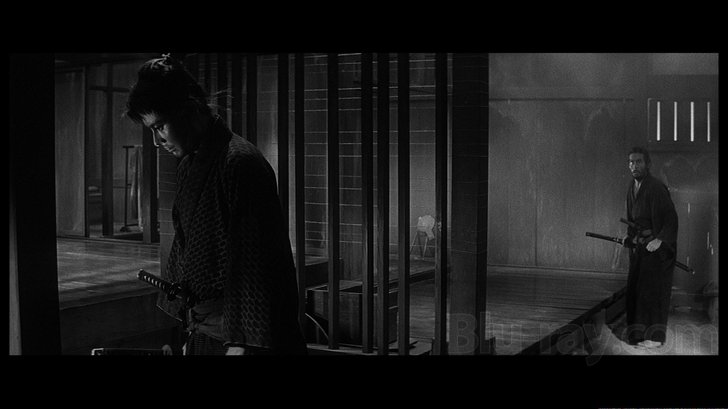
Presented in an aspect ratio of 2.34:1, encoded with MPEG-4 AVC and granted a 1080p transfer, Masaki Kobayashi's Harakiri arrives on Blu-ray courtesy of Criterion.
Criterion's high-definition transfer appears to have been sourced from the same Shochiku master which British distributors Eureka Entertainment had access to when they prepared their Blu-ray release of Harakiri. Naturally, the two share some similar characteristics. However, they are not identical.
Detail is once again very impressive, especially during close-ups. Criterion's transfer is also slightly darker, but during the indoor scenes, where most of the time light is restricted, clarity is again very good. The small color pulsations from Criterion's SDVD release of Harakiri have been effectively addressed. As I expected, however, Criterion have strengthened black levels and also adjusted sharpness levels during selected sequences. The grays also tend to be slightly stronger, though they do not appear drastically different than the ones seen on the UK Blu-ray release; the whites are slightly better saturated. As a result, Criterion's release has a marginally richer but also occasionally harsher look (see screencapture #1). Lastly, there are no traces of excessive noise reduction. Unsurprisingly, there is a layer of fine grain throughout the entire film. There are no large cuts, debris, stains, or warps to report in this review. (Note: This is a Region-A "locked" Blu-ray disc. Therefore, you must have a native Region-A or Region-Free PS3 or SA in order to access its content).
Harakiri Blu-ray Movie, Audio Quality 
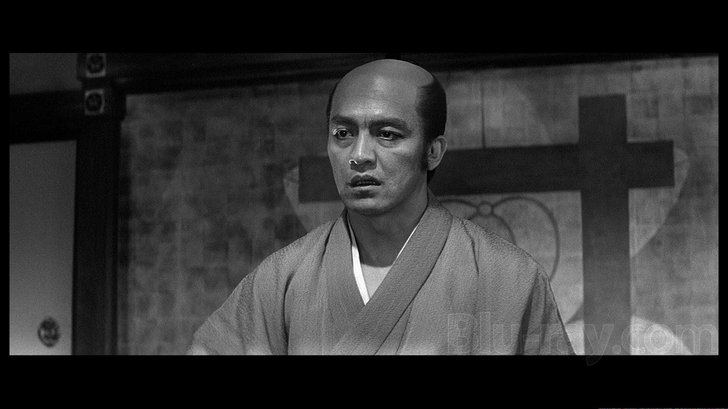
There is only one audio track on this Blu-ray disc: Japanese LPCM 1.0. For the record, Criterion have provided optional English subtitles for the main feature. When turned on, they appear inside the image frame.
I compared selected scenes - and specifically scenes where the biwa solos are prominent - from the Criterion release and the UK Blu-ray release (which features a Japanese DTS-HD Master Audio 2.0 track). As far as dynamic intensity and crispness are concerned, the two are practically identical. The dialog is also equally clean, stable, and easy to follow. However, I did notice some very minor differences in the English translation.
Harakiri Blu-ray Movie, Special Features and Extras 
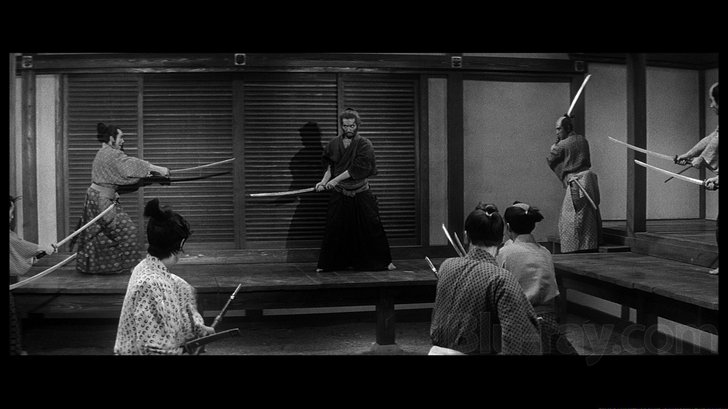
- Introduction - a video introduction to Harakiri by Japanese-film historian Donald Richie. The introduction was recorded exclusively for Criterion in New York in 2004. Please note that the introduction contains spoilers. In English and Japanese, with optional Japanese subtitles where necessary (during the film clips). (12 min, 1080i).
- Masaki Kobayashi - a short but very good interview with Masaki Kobayashi conducted by fellow director Masahiro Shinoda. The two directors discuss the success of Harakiri, the graphic scenes in the film, Toru Takemitsu's terrific score, etc. The interview was filmed for the Directors Guild of Japan, on October 14, 1993, at the Haiyuza Theatre, Tokyo. The same interview appears on the Eureka Entertainment Blu-ray release. In Japanese, with optional English subtitles. (10 min, 1080i).
- A Golden Age - in this video interview, Japanese icon Tatsuya Nakadai discusses his performance in Harakiri, career, and the Japanese film industry. The interview was conducted exclusively for Criterion in Tokyo in 2005. In Japanese, with optional English subtitles. (15 min, 1080i).
- Masterless Samurai - in this video interview, Harakiri screenwriter Shinobu Hashimoto discusses his creative process, collaboration with Masaki Kobayashi, and the reactions the film generated after its premiere. In Japanese, with optional English subtitles. (13 min, 1080i).
- Trailer - the original Japanese theatrical trailer for Harakiri. In Japanese, with optional English subtitles. (4 min, 1080i).
- Booklet - an illustrated booklet featuring an essay by film scholar Joan Mellen and a reprint of a 1972 interview with Masaki Kobayashi.
Harakiri Blu-ray Movie, Overall Score and Recommendation 

As expected, Criterion's Blu-ray release of Masaki Kobayashi's Harakiri is impressive. It looks slightly different when compared to Eureka Entertainment's release, but both are hugely satisfying. I personally think that overall Criterion's release is the better package, because it has a better selection of supplemental features, but I cannot see how anyone could be in any way disappointed with Eureka Entertainment's release. Whether you reside in a Region-A or Region-B country, and no matter which release you choose, you are in for a very, very special treat. VERY HIGHLY RECOMMENDED.
Similar titles
Similar titles you might also like

Sansho the Bailiff
山椒大夫 / Sansh˘ dayű
1954

The Human Condition I: No Greater Love
人間の條件 / Ningen no j˘ken / Parts 1 and 2
1959

The Human Condition III: A Soldier's Prayer
人間の條件 / Ningen no j˘ken / Parts 5 and 6
1961

The Human Condition II: Road to Eternity
人間の條件 / Ningen no j˘ken / Parts 3 and 4
1959

Throne of Blood
蜘蛛巣城 / Kumonosu-j˘
1957

Kuroneko
藪の中の黒猫 / Yabu no naka no kuroneko
1968

Tokyo Story
東京物語 / T˘ky˘ monogatari
1953

The Sword of Doom
大菩薩峠 / Dai-bosatsu t˘ge
1966

A Brighter Summer Day
牯嶺街少年殺人事件
1991

Three Outlaw Samurai
三匹の侍 / Sanbiki no samurai
1964

The Life of Oharu
西鶴一代女 / Saikaku ichidai onna
1952

Kagemusha
影武者
1980

Ikiru
生きる
1952

Hara-Kiri: Death of a Samurai
一命 / Ichimei
2011

Yi Yi
一一
2000

Ran
StudioCanal Collection
1985

Onibaba
鬼婆
1964

The Traveler
مسافر | Remastered
1974

Akira Kurosawa's Dreams 4K
夢 / Yume
1990

High and Low 4K
天国と地獄 / Tengoku to jigoku
1963